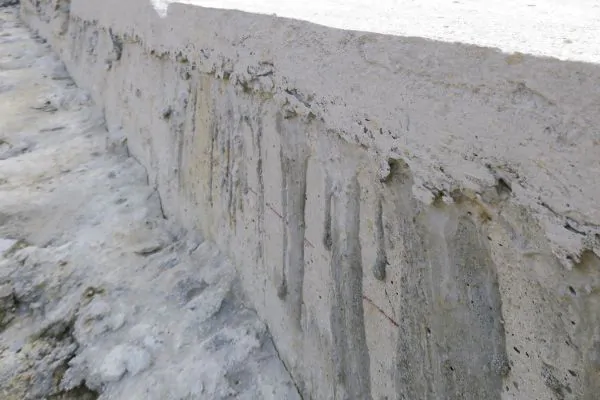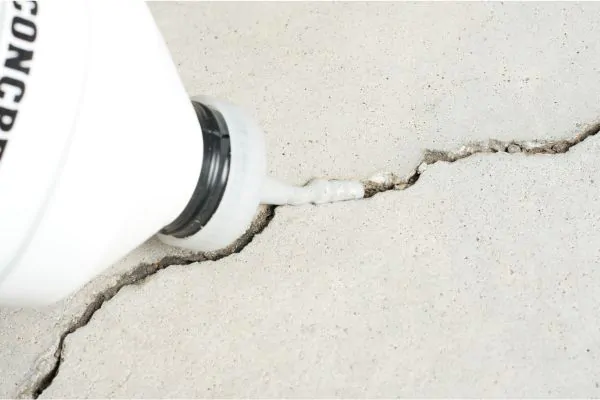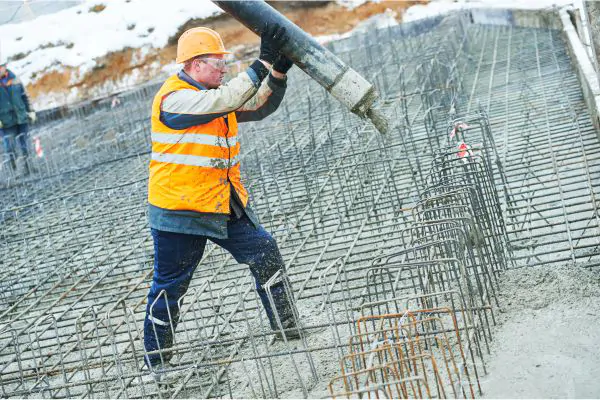Choosing the right thickness for your concrete driveway isn’t as straightforward as it might seem. Many homeowners underestimate the complexity behind such a decision, and without proper guidance, errors can be costly.
As someone who has spent years in the construction industry, specializing in concrete installations, we’ve seen firsthand the difference that expert knowledge makes. Our experience ensures that what you read here is grounded in professional practice and observation.
A crucial detail to keep in mind is that an inadequately chosen thickness can lead to premature cracking and damage, necessitating expensive repairs. This article aims to demystify the process of selecting the ideal concrete driveway thickness by examining various critical factors.
You’ll find insights here not readily available elsewhere. Read on for clarity.
Factors to Consider for Concrete Driveway Thickness
When choosing the right concrete driveway thickness, factors such as the function of the driveway, local building codes, and climate must be carefully considered. Proper subgrade support and edge support are also crucial aspects to think about for a durable and long-lasting concrete driveway.
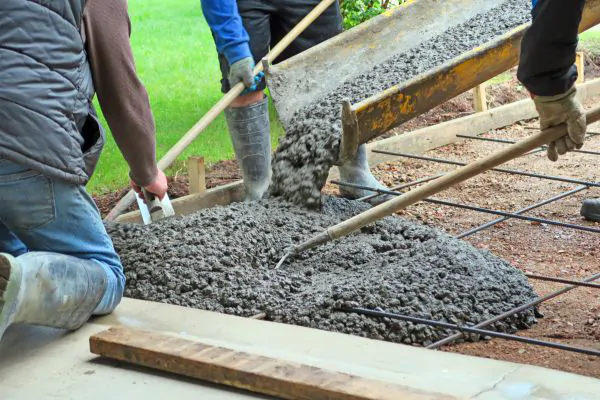
Function of the driveway
The function of the driveway plays a crucial role in deciding the concrete thickness for driveway projects. If you use your driveway just for parking light vehicles like cars and bikes, a standard concrete driveway depth might be sufficient.
However, suppose your driveway will see heavier traffic, such as delivery trucks or RVs. In that case, you’ll need a thicker layer of concrete to withstand the added weight without cracking.
Accurately choosing driveway concrete thickness ensures durability and longevity. It prevents common problems such as cracks and potholes after installation.
This choice impacts not only how well your driveway performs under stress but also its maintenance costs over time.
Subgrade support
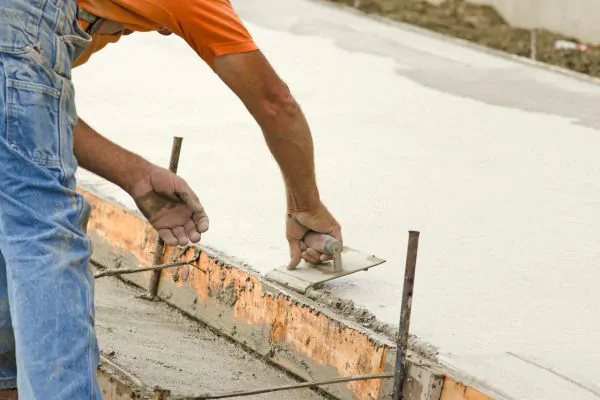
Subgrade support plays a critical role in determining the thickness driveway concrete needs to be. A strong, stable subgrade provides the foundation that supports your driveway. Think of it as the bedrock for your concrete; if it’s solid and well-prepared, your driveway stands a better chance against cracking and shifting over time.
Ideal concrete Contractors focus on compacting the soil beneath where the concrete will go, ensuring it’s level and free from any materials that could cause settling.
To make sure your driveway lasts for years, experts also consider the type of soil in your area since different soils have varying weight-bearing capacities. Clay soils, for example, might require additional layers or specific treatments to enhance their load-bearing capabilities before pouring the driveway concrete thickness recommended by local standards.
Ensuring proper subgrade support not only contributes to a longer-lasting driveway but also helps in preventing common issues like cracks or heaves due to seasonal changes.
Local building codes
Local building codes play a crucial role in determining how thick driveway concrete should be. These regulations are established by local authorities to ensure safety and durability in construction projects.
Before starting your driveway project, you must check with the city or county building department. They will provide guidelines on the minimum thickness for concrete driveways based on your location’s specific needs and standards.
Remembering these requirements is essential because they can vary significantly from one area to another. For instance, regions prone to frost may have stricter rules to prevent cracking due to freeze-thaw cycles.
Failing to comply with these codes could result in costly repairs down the line or even require redoing the entire driveway. Always make compliance with local building codes a top priority for a successful driveway installation.
Climate
The climate plays a significant role in determining the right concrete driveway thickness. Extreme temperatures, frequent freezing and thawing cycles, or high levels of moisture can impact the durability of the driveway.
It is essential to consider these factors when determining the appropriate concrete thickness to ensure long-lasting performance and minimize potential damage.
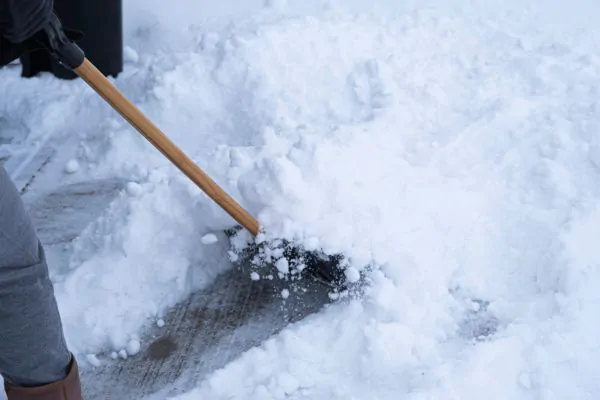
Understanding how climate affects your concrete driveway will help you make an informed decision about its thickness, ensuring it withstands the local weather conditions over time.
Edge support
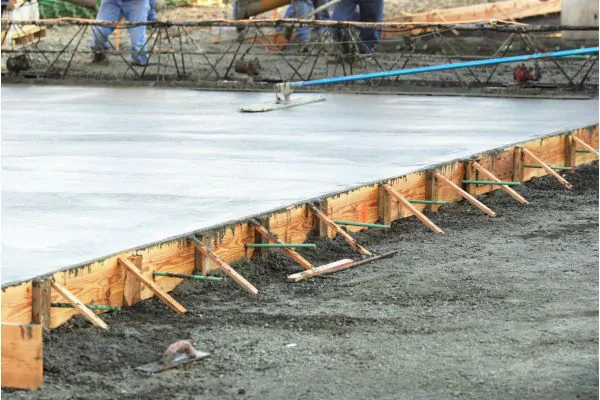
Edge support is an important factor to consider when determining the thickness of your concrete driveway. It plays a vital role in maintaining the structural integrity of the driveway and preventing cracks or damage over time.
Proper edge support ensures that the concrete remains stable and can withstand external pressures, such as the weight of vehicles driving on and off the driveway.
Incorporating robust edge support into your concrete driveway construction enhances its durability and longevity. By providing adequate reinforcement along the edges, you can mitigate potential issues that may arise from wear and tear, changes in temperature, or other environmental factors.
Budget
When considering the right concrete driveway thickness, budget plays a crucial role. It’s important to determine the cost of materials and labor needed for the desired thickness. Exploring different options can help ensure that you stay within your budget while still achieving a durable and long-lasting concrete driveway.

Incorporating budget considerations into your decision-making process is essential for creating a cost-effective yet reliable concrete driveway. By evaluating various factors such as material costs, labor expenses, and long-term maintenance requirements, you can make an informed decision about the most suitable thickness for your concrete driveway.
Optimal Thickness for Residential vs Commercial Driveways
For residential concrete driveways, consider a standard concrete thickness that suits regular vehicle use. Commercial driveways require a minimum concrete thickness to withstand heavier traffic and larger vehicles.
Residential: Standard concrete driveway thickness
The standard concrete driveway thickness for residential purposes usually ranges from 4 to 6 inches. This level of thickness is suitable for regular vehicle traffic and provides the necessary strength and durability for everyday use.
It ensures that the driveway can withstand typical loads and weather conditions, providing a stable surface for vehicles to park and maneuver on.
Contractors typically recommend this thickness as it strikes a balance between cost-effectiveness and durability. The standard concrete driveway thickness offers sufficient support while being budget-friendly, making it a practical choice for most residential property owners seeking robust and long-lasting driveways.
Commercial: Minimum concrete driveway thickness
Commercial concrete driveways require a minimum thickness of 6 inches to withstand the heavy traffic and vehicle weight they endure. This ensures that the driveway can bear the load without cracking or sinking.
The added thickness provides durability and longevity, making it suitable for commercial use. It also helps with better support for larger vehicles.
Importance of Proper Construction Techniques
Proper preparation of the subgrade and using the correct concrete mix ensures a durable driveway. Adequate drainage and proper curing techniques are also fundamental for long-lasting performance.
Proper preparation of subgrade
Properly preparing the subgrade is crucial for a sturdy concrete driveway. The subgrade must be compacted and leveled to provide a stable base for the concrete. This ensures that the driveway can bear heavy loads without cracking or sinking over time.
Additionally, addressing drainage issues in the subgrade is vital to prevent water accumulation beneath the concrete, which could cause erosion and structural damage.
Before pouring the concrete, it’s essential to remove any debris or organic materials from the subgrade, as these can lead to voids and weakened areas in your driveway. Furthermore, using a granular material like gravel or crushed stone as a base layer can further enhance stability by providing good drainage and reducing soil expansion due to weather changes.
Correct concrete mix
When constructing a concrete driveway, using the correct concrete mix is crucial. The mix should typically consist of cement, sand, gravel or crushed stone, and water. It’s important to use the correct proportions to achieve the desired strength and durability for your driveway.
Adding reinforcements such as steel mesh or fibers can further enhance the strength of the concrete mix.
The use of additives like air-entraining agents and plasticizers can also modify the properties of the concrete mix to suit specific needs. These additives can improve workability, reduce water content, and increase resistance to freeze-thaw cycles in colder climates.
Reinforcement with rebar or wire mesh
Transitioning from the correct concrete mix, reinforcement with rebar or wire mesh plays a crucial role in ensuring the durability and strength of your concrete driveway. By adding this reinforcement, you significantly enhance its load-bearing capacity and resistance to cracks.
This is vital for supporting the weight of vehicles and preventing damage from changes in temperature or soil movement, delivering a longer-lasting solution for your driveway concrete thickness needs.
Reinforcement with rebar or wire mesh is essential for maximizing the structural integrity of your driveway concrete. It ensures that your investment in a sturdy and reliable surface pays off by providing lasting support without compromising on quality or safety.
Placement of joints
Proper placement of joints in a concrete driveway is essential to help control cracking. Joints should be strategically located and adequately spaced to accommodate the natural expansion and contraction of the concrete.
By placing joints at specified intervals, you can prevent unsightly cracks from forming on the surface of your driveway. It’s also important to ensure that joints are properly tooled or sawed into the concrete within 24 hours after finishing it.
Strategically placed joints provide relief points for stress induced by temperature changes and shrinkage, preventing uncontrolled cracking in your driveway over time. Contractors often use a jointing tool during finishing or make saw cuts shortly after pouring to create weakened areas that encourage controlled cracking, thereby preserving the structural integrity and appearance of the concrete surface.
Adequate drainage
Proper drainage is crucial for concrete driveways. It ensures that water does not pool on the surface, preventing potential damage and extending the driveway’s lifespan. Driveway slopes must direct water away from structures and towards safe runoff areas.
Adequate drainage protects concrete from cracking due to freeze-thaw cycles, keeping it in optimal condition over time. Properly installed drainage also helps to avoid erosion and soil expansion beneath the concrete, maintaining structural integrity and reducing maintenance costs.
Proper curing techniques
Proper curing techniques are crucial for ensuring the strength and durability of your concrete driveway. Curing helps prevent cracks and enhances the overall quality of the surface.
During curing, it is essential to keep the concrete moist to allow it to reach its maximum potential strength. Applying a curing compound or covering the concrete with wet burlap can help maintain necessary moisture levels during this process.
Another effective method involves using a sprinkler system to create a consistently moist environment for several days after pouring the concrete. Additionally, sealing the concrete once it has fully cured offers long-term protection against stains, abrasion, and weather damage which contributes to extending its lifespan significantly.
Conclusion
When selecting the right concrete driveway thickness, consider factors like function, local building codes, climate, edge support, and budget. Residential driveways typically require a standard concrete thickness while commercial ones need a minimum thickness.
Proper construction techniques such as subgrade preparation, correct mix, reinforcement, joint placement, drainage considerations, and curing methods are crucial for durability. Ultimately, the chosen thickness needs to align with the specific requirements of your project for long-term performance on your property.

